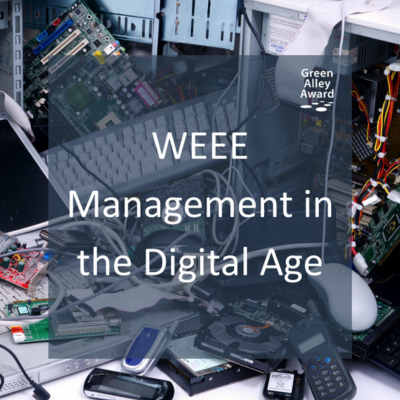
WEEE Management in the Digital Age: Challenges, Solutions, and Future Prospects
The cycle of changes: WEEE
Waste Electrical and Electronic Equipment (WEEE) refers to discarded electronic devices and appliances. As our lives become increasingly digital and technology-driven, the accumulation of WEEE has become a growing concern. These discarded items, ranging from old smartphones to refrigerators, contain valuable materials and hazardous substances.
Proper management of WEEE is crucial for several reasons. First, electronic waste often contains precious metals like gold, silver, and copper, which can be recovered through recycling. This not only reduces the demand for new mining but also helps conserve Earth's natural resources.
Second, many electronic devices contain hazardous substances such as lead, mercury, and flame-retardant chemicals. When improperly disposed of, these substances can leach into soil and water, posing serious risks to human health and the environment. Responsible recycling and disposal of WEEE prevent these toxins from causing harm.
To address the WEEE challenge, many countries have implemented regulations and initiatives to encourage proper handling. These include collection centres, where individuals can drop off their old electronics for recycling, and extended producer responsibility (EPR) programs, which hold manufacturers accountable for the end-of-life disposal of their products.
Individuals can also contribute by being mindful of their electronic consumption, repairing devices when possible, and donating or recycling them through authorized channels. By taking these steps, we can reduce the negative impacts of WEEE and move towards a more sustainable and environmentally friendly future.
Some of our finalists are actively working on solutions to make this industry branch more circular, addressing its sustainability challenges.
Circular Technologies
This Italian startup specializes in the sustainable management of IT hardware for the B2B sector.
Their innovative marketplace, reValue, seamlessly connects businesses with refurbishers and recyclers. Through their solutions, companies can maximize the value of their used ICT assets, access top-tier refurbished devices, and certify the environmental footprint of their assets.
If you are interested in learning more about their inspiring efforts and contributions to sustainable practices, click here to read more about them.
TAZAAR
TAZAAR aims to change the lifecycle of electronics and electricals with a clear mission: to transform the way we use, reuse, and recycle these products. Through their digital platform, they empower both manufacturers and end-users to make conscious decisions that positively impact the environment. By providing comprehensive tracking and information throughout the product's lifecycle, they enable manufacturers to optimise reusability, recyclability, and waste reduction. At the same time, they equip end-users with the knowledge they need to make informed choices, fostering a culture of conscious consumption. To know more about the startup, click here.
How can we help with WEEE waste?
- You can bring them to your local recycling centre or civic amenity site.
- You can also bring WEEE to a shop or retail outlet. It does not have to be the same place where you bought the original product. They take it back when you are buying a new one but only if the shop sells the same type of product.
- You can return waste batteries to any retailer but only if they are selling the same types of batteries.
For their impressive efforts in revolutionizing fashion sustainability. Join us in supporting these startups for a greener future.
Want to keep updated about the latest startup innovative solutions? Follow us on LinkedIn!